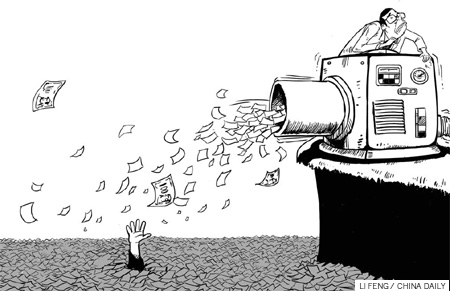Debate: High inflation

Zhong Jiyin: Review of monetary policy important
The central government has taken a set of emergency measures to prevent a further increase in the consumer price index (CPI), which rose to 4.4 percent in October, the highest in 25 months. The continuous rise in the CPI, a measure of inflation, is creating obstacles for the government to keep the entire year's inflation below 3 percent.
The measures the government has taken to keep inflation in check include increasing the supply of agricultural products, reducing their logistical cost, ensuring adequate supply of chemical fertilizers, coordinating the supply of coal, oil and natural gas, and granting subsidies to low-income families.
Local governments, too, have started taking measures such as granting provisional subsidies and strengthening market supervision.
But inflation is not the result of short-term problems. Instead, it is the result of years-old problems. And the situation worsens as one problem follows another.
Given the continuous increase in prices of essentials, the government's emergency measures may help ease only part of the problems, and not solve all of them once and for all.
In fact, the government has been using administrative measures, often provisional, to overcome the problems arising out of the ongoing economic and social development. The measures are no different this time. Even though they are the strictest-ever and reflect the government's determination, they may not be able to lift the shadow of inflation hanging over the economic boom.
With due respect, the government should review its monetary policy, rather than attribute all the problems to hot money and speculators. The rise in prices of agricultural products this time, some of which are very high, has been triggered by inflation.
Experience shows the government's first response to inflation is to strengthen efforts to prevent people from raising prices artificially and spreading rumors.
But such government measures can only frighten speculators in the short term. New speculators, as experience shows, are bound to enter the arena later and raise prices of other commodities and spread rumors anew. Speculation and rumors are often based on inflationary fears, which have a close link with the monetary policy.
Controlling fund liquidity may be an especially difficult task because by the end of September, the country's broad money supply, or M2, had reached nearly 70 trillion yuan ($10.54 trillion), more than double of last year's GDP of 33.54 trillion yuan.
This huge increase in the supply of money, combined with the low interest rate, is shrinking the wealth of medium and low-income groups. Vulnerable groups that are forced to save as much money as they can and put it in banks to deal with future hardships can do nothing but see the worth of their bank deposits fall day by day.
These groups are the hardest hit by the rise in prices of agricultural products, because they spend a large proportion of their income to buy them. Economics tells us that the poor spend a greater percentage of their total income on essentials. So, even the slightest rise in the prices of essentials, such as farm products, will hurt such people severely.
The government indeed has taken measures to control prices and is committed to keeping them under check. The People's Bank of China, the country's central bank, announced on Nov 19 that it would raise the required reserve ratios for banks by 50 basis points from Nov 29. It will be the fifth increase this year and a surprise, too, because only last month the one-year benchmark interest rate was raised by 25 basis points.
These measures may help ease the situation, but they are not enough to reverse it. The increase in the required reserve ratios for banks can prevent the rise of excess liquidity and ensure that the situation does not deteriorate further.
But they will do little to get rid of the existing excess liquidity. Increasing interest rates is a common measure taken to check inflation. But as things stand today and given the tension prevailing in the market, interest rates have to be increased by another 200 basis points.
Besides, the pressure of inflation on real life is more severe than what government figures suggest. So, the government should change the way it calculates the CPI and give rising prices of vegetables and other essentials the importance they deserve. In other words, it should include products that have become daily necessities in today's China in the basket of products used to calculate the CPI.
History tells us that almost all major economies went through deflation rather than inflation during their transformation from agricultural to industrial societies, such as the US from the 1860s to the 1900s. But China's problem is inflation. And that makes it imperative for the government to pay more attention to the monetary policy.
The author is an economist with the Chinese Academy of Social Sciences.
 0
0 






